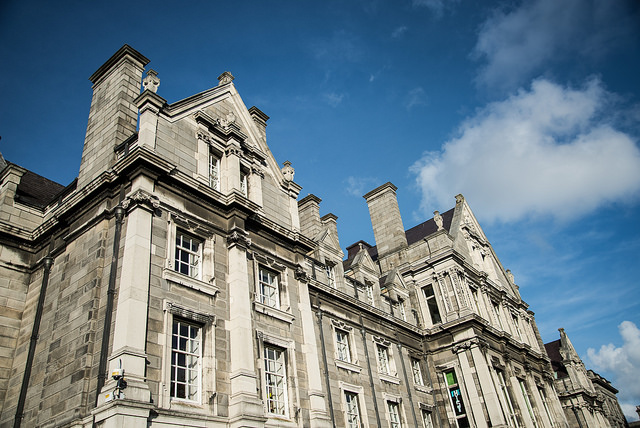
Human sociality and the ethics of Santa Claus were some of the issues raised on Wednesday evening for the final of the College Historical Society’s (the Hist) Rosaleen Mills Maidens Competition in the Graduates Memorial Building (GMB). Eight novice speakers argued the merits and failings of a world with radical honesty, each hoping to win a coveted internship with Hist sponsor EY next summer.
The motion for the final was ‘This House Prefers A World With Radical Honesty’.Organised by Record Secretary Maitiú Charleton, the grand final was adjudicated by five of Ireland’s most prestigious debating judges: Sébastien Dunne Fulmer, Caoimhin Hamill, Lucy Murphy, Aoileann Ní Mhurchú, and Jack Williams. Members of this star-studded panel have judged elimination rounds at the World Universities Debating Championships (WUDC), European Universities Debating Championships (EUDC) and Asian British Parliamentary Debating Championships (ABP). Head judge, Caoimhin Hamill, is also one of Europe’s best speakers: he has spoken in finals at Princeton IV, Yale IV and EUDC, and holds the record for the most team points ever achieved at EUDC. The debate was chaired by Sam Kelly and David Wolfe.
First-year student Síofra O’Reilly emerged victorious after a very high-quality debate. Rachel Chen and Jack Sweeney were joint second place. Rachel Chen, one of the night’s co-runner ups, opened the debate with an argument that radical honesty would lead to healthier engagement with social media, as in today’s world, our fake online personas only “emphasise what our real lives will never have”. She further argued that we would have less “dysfunctional communication” if we were radically honest with one another, which would lead to faster conflict resolution. Finally, Chen told us that “dishonesty is the weakness of democracy” and, in a radically honest world, government institutions would be more transparent.
First opposition speaker and fellow co-runner up Jack Sweeney protested the idea that honesty is an inherently good concept. He pointed out that “an act of dishonesty can cause just as much joy” as an act of honesty. The story of Santa Claus brings joy to children all over the world, and “the joy is real and substantive, even if the story is not”. He further argued that humans, unlike other animals, are social creatures, and we would lose something if an inability to tell harmless lies caused “countless potential relationships to be discarded before they even begin”.
Malika Maniar, continuing the case for the proposition, told the crowd that a radically honest world was simply a better one. She posited that “it is in the pursuit of honesty and truth that the world becomes a better place”. On an individual level, people would no longer have to “hide behind half-truths and emissions” but instead “are more likely to get what they want because they’re able to ask for it”. Communities would also have higher levels of trust because trust is only possible “when people know what you think, what you feel, and where they stand”.
Mary Woods opened her argument with the statement that “radical honesty destroys trust and communities”. It’s impossible to trust that anyone will always be on your side, because “in order to be honest, there must be a constant shifting of allegiances”. Additionally, it is difficult for protest groups to rally for support because, in a radically honest world, they must be honest about the level of work required for very little payoff. Woods told us that “sometimes, you have to lie to get closer to the ideal” and that any incremental change brought by these groups is valuable.
Daire Doyle O’Brien argued that the utilitarian framework of the earlier speakers was not the most important, but that there were moral reasons to prefer a world without lies. He explained that “when someone lies to someone else, they are presenting a false perception of what reality actually is”. This false perception can influence people to make different choices than they otherwise would. Lying is wrong in itself, Doyle O’Brien said, because “when we’re not honest, we aren’t reciprocating the human dignity others show to us”.
Maidens champion Síofra O’Reilly won the debate with an impassioned argument about lying as a form of self-defence. She argued that “not everyone in society deserves honesty, especially when the person being honest is in danger”. For women and minorities especially, who might otherwise offer a false name or address to protect their own safety, a radically honest world “would force them to give personal information to a potential predator”. O’Reilly also explained that the closest analogy to a world of radical honesty is Twitter, which is “a glorified cesspit of keyboard warriors”. But Twitter has stipulations that protect people from hate speech and death threats: a radically honest world would not.
Closing the debate for the proposition side, Donncha Murphy argued that a radically honest world would be liberating for so many people. In our world, “men feel they must be strong and not show vulnerability”, and thus there is pressure not to be honest about their emotions. Similarly, an academic student feels an “immense pressure to conform to people’s expectations and ideas of you”. Murphy explained that “most people want to be honest”. A radically honest world, “instead of putting walls between them and others, would give these people the space to be open and be vulnerable”.
Kurt Scott closed the debate as a whole by arguing that a radically honest world is not necessarily one where we are all on the same page, but instead one “where people stop asking certain questions”. Scott explained that “most of us believe our family loves us, our friends trust us” and “we have no way of knowing this is true, but we believe it anyway”. In a radically honest world, that faith wouldn’t be enough.
While the panel adjudicated, competitors and audience members moved to Kennedy’s for a reception. Convenors and finalists alike let out a sigh of relief.






